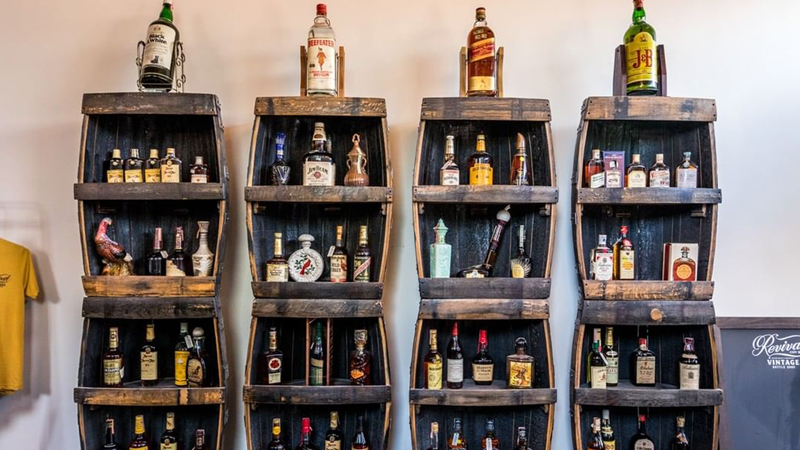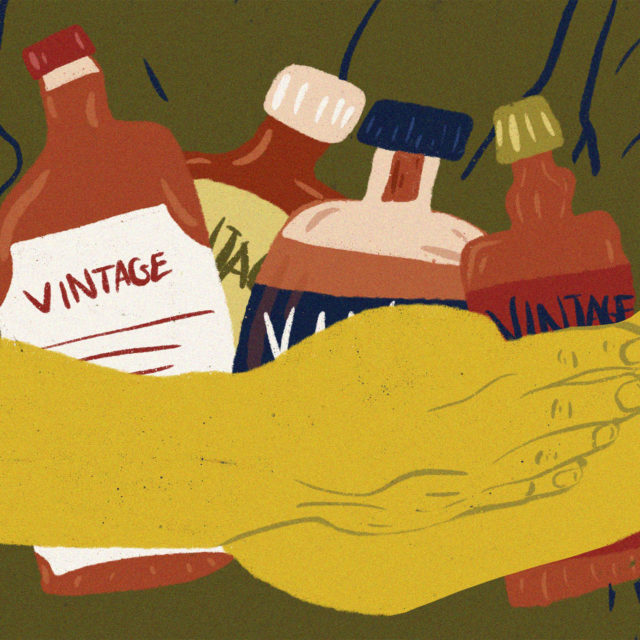Gone are the days when whiskey hunters could enter off-the-beaten-path liquor stores and expect to leave with a haul of rare, out-of-production bottles. In recent years, the options for scoring vintage bottles (known to collectors as “dusties”) have been all but limited to auctions or illegal secondary marketplaces on social media networking sites.
In Kentucky, that dynamic has changed. The big-game targets of dusty hunters can now be bought and sold legitimately by the state’s bars, restaurants, and retailers, thanks to a landmark vintage spirits bill that came into effect in 2018.
In the two years since the bill was enacted, every level of Kentucky’s alcohol industry has found innovative ways to profit from the now-legal secondary market. Distilleries have added new attractions to their on-site experiences; new categories of alcohol retailers have sprung up to meet the demand for dusties. Some on-premise locations have made vintage spirits the core of their drinks programs, while others have included just a few dusties to add a dram of nostalgia to their menus.
Bringing the World’s Best Bourbon Libraries to Kentucky
Enacted on Jan. 1, 2018, House Bill 100 (HB 100) allows distilled spirit license holders to buy “vintage spirits” from non-licensed individuals then sell them by the pour or by the bottle. The bill defines vintage spirits as “a package or packages of distilled spirits that are in their original manufacturer’s unopened container; are not owned by a distillery; and are not otherwise available for purchase from a licensed wholesaler within the Commonwealth.”
Such legislation is not the first of its kind in the U.S., though only a handful of states have similar statutes. Bars in Chicago, Washington D.C., and Portland, Ore., have built impressive collections of rare vintage bottles, gaining them national recognition. Among them, and most notable of all, is Washington D.C.’s Jack Rose Dining Saloon, whose list boasts more than 2,700 bottles.
Jack Rose was, in fact, part of the inspiration for Kentucky’s legislative change. “Every time we go to Washington, we pretty much live at Jack Rose because of that fabulous bourbon library,” says Eric Gregory, president of the Kentucky Distillers’ Association (KDA). “One day we finally said, ‘The world’s greatest bourbon libraries should be here in Kentucky.’”
While the KDA helped draft HB 100, not everyone in the association — nor the state — supported the bill, says Chad McCoy, state representative for Nelson County, Ky., and the legislator who sponsored the bill.
“We’re in the heart of the Bible Belt, so we have a large population that has a moral objection to drinking; not every county allows the sale of alcohol,” McCoy says. “Getting a law passed that’s going to possibly allow more alcohol sales is a challenge, even though this is a massive industry for Kentucky.”
The progressive legislation also brought mixed responses from distilleries. Fears that HB 100 would create a platform for counterfeits fueled pushback from some producers. Those concerns were ultimately alleviated by the stipulation that all sales must be reported to Kentucky’s Alcoholic Beverage Control (ABC). “We can prove who the buyers and the sellers are, so now there’s accountability,” says McCoy.
The bill doesn’t just offer once-in-a-lifetime drinking experiences for spirits lovers, nor is this simply a case of clamping down on phony bottles of Pappy. For the first time, there’s a legitimate outlet for Kentucky residents looking to offload inherited collections they don’t intend to drink. Historically, many distilleries included whiskey in their workers’ compensation packages, so it’s a surprisingly common scenario.
Gregory says the KDA receives regular calls from state residents asking what they can do with unopened bourbon cases they discovered while cleaning out a relative’s attic or basement.
“Now there’s an avenue to sell it,” he says and adds that it’s a win-win scenario all around. “The state loves it because they’re getting another tax hit on it. And consumers love it because now they can try something that they [previously] had to buy in secret on the black market.”

Profiting From Kentucky’s Vintage Spirits Law
Set on 100 acres of working farmland, Bardstown Bourbon Co. touts its distillery experience as a “Napa Valley-style destination” and the first of its kind on the Kentucky Bourbon Trail. The distillery amassed a library of over 400 antique bottles from private collectors before opening its “Bottle & Bond” bar and restaurant in June 2018. “We were getting ready to open the restaurant just as the legislation passed,” says Dan Callaway, Bardstown’s vice president of hospitality and product development. “It was perfect timing for us.”
Esteemed bourbon author Fred Minnick helped curate the menu, which features bottles that date back to 1892. Prices for 1-ounce pours range from $30 for 1970s-era Wild Turkey to $2,500 for ultra-rare expressions from the Van Winkle collection. Callaway says the aim was to create a balanced list that lets guests taste the history of Kentucky bourbon across a range of price points. It was essential to place lower-priced, accessible “steals” on there, but thousand-dollar pours were necessary to include rarer bottles and keep replenishing the collection, he says.
A new “speakeasy-style” tasting room, set to open in late September, will soon showcase Bardstown’s impressive vintage bottle collection. It will also offer another revenue stream as it will be used to host private tastings. But even then, the bottle library will never represent a significant income generator for Bardstown — a distillery that makes 7 million proof gallons of bourbon a year. Instead, “it’s about creating experiences,” Callaway says.
Off the beaten track, locals and tourists also take advantage of Kentucky’s vintage spirits legislation more modestly. At The Merrick Inn, in Lexington, the most expensive pour guests will find on the menu sells for $60 per ounce (an 18-year-old Jefferson’s Presidential Select distilled at the now-shuttered Stitzel Weller distillery). “We don’t have a big market here for pre-Prohibition bottles and $200- or $300-ounce pours,” bar manager Dexter Murray says.
All the vintage bottles sold at The Merrick Inn came from Murray’s personal collection, amassed over years of dusty hunting that began when he was 21. Rather than a means of attracting crowds, introducing vintage pours to the drinks menu was a simple way to add depth to the restaurant’s already award-winning bourbon selection, Murray says.
“People from out of town love to get something from their birth year or that they remember their dad or grandfather drinking,” he says. “It was a no-brainer for me to hop on that as soon as the legislation passed.”
Brad Bonds, co-owner of Revival, a vintage bottle shop in Covington, Ky., is also a longtime dusty hunter. Before opening his store earlier this year, Bonds built a vintage spirits division at Cork N’ Bottle, another Kentucky retailer. At Revival, however, dusties are not just part of the offering; they represent the business’s foundation.
Revival doesn’t just offer out-of-production whiskeys; the store also trades in vintage rum, gin, Scotch, and tequila. “If it’s old, I want it,” Bonds says. Revival also has an in-house tasting room, where customers can enjoy daily happy hours before committing to purchases. Anyone looking to walk away with some 1970s-era Jim Beam can sample a half-ounce pour for just $5 during happy hour.
Bonds had to overcome multiple challenges to launch the business, including the global pandemic. But up until now, sourcing bottles has not been an issue. “People are constantly bringing us their treasures of yesterday because they don’t want them anymore,” he says. “I’m here to find them a new home.”
Bill Thomas, the owner of Washington, D.C.’s Jack Rose, agrees that times have changed since the glory days of dusty hunting 20 years ago. The vintage bottles are still out there, he says, though they’re usually lurking in basements rather than on run-of-the-mill liquor store shelves.
As someone who’s been buying, drinking, and selling vintage spirits for two decades, Thomas has watched stocks deplete and seen bottles that once sold for $9 per pour fetch 40 times that much — and that was before bars and restaurants throughout Kentucky got in on the action. So how does he feel about the new quasi-democratized, vintage spirits landscape he partly inspired?
“I’m glad for these laws,” he says. “We have to get stuff out of basements, attics, and closets, where it’s no use to anyone. Let’s get them in the hands of drinkers.”
This story is a part of VP Pro, our free platform and newsletter for drinks industry professionals, covering wine, beer, liquor, and beyond. Sign up for VP Pro now!
